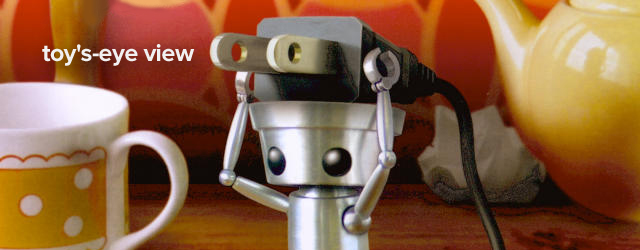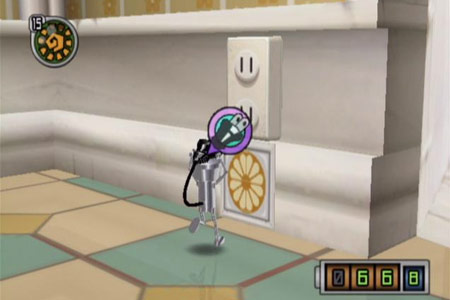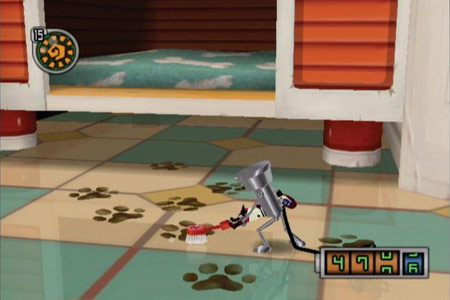
Many video games have the odd habit of including banal, everyday routines as part of their gameplay. This certainly seems like a counterintuitive approach to design– after all, chores are the complete antithesis to fun, something to which many a seven-year-old can attest, and doing them in a video game is essentially nullifying the sense of escapism the medium offers. Despite this, some series hinge their entire premise around these inglorious activities, and they have even begun to crop up in games not usually known for their realism (Mario’s brief stint as a glorified street cleaner immediately springs to mind).
Chibi-Robo! is often lumped together with the rest of these titles, and at a cursory glance it is easy to see why– picking up refuse and scrubbing floors are very prominent parts of its gameplay, creating the appearance that the title is little more than a cleaning simulator. While there is some truth to this, where it differs from other such games is in its focus. The chores, rather than forming the crux of the gameplay, are simply a means to an end, a way to tie together the game’s true objectives in a unified and cohesive fashion. You see, at its heart, Chibi-Robo! is in actuality an adventure game, but its defining characteristic is that it occurs through the eyes of a toy-sized protagonist. Your role as a sentient vacuum is essentially license to explore the premises at your leisure, and the title makes sure to emphasize your small stature in this world through every facet of its design.

This perspective, I think, is largely why Chibi-Robo! is such an enjoyable experience, transforming a quaint little setting into an expansive land beckoning to be explored. After all, how many children, especially after witnessing Toy Story for the very first time, could not help but imagine what it would be like to see the world through a toy’s perspective? Chibi-Robo! comes closest to fulfilling this fantasy, tapping into the same sense of wonder that fueled Pixar’s debut film so many years ago. No longer was the home a mundane place devoid of adventure; now, even the simplest of tasks was a monumental ordeal– ascending a staircase became an arduous climb akin to scaling a mountain, while the pet dog became a ferocious monster that struck fear into the plastic hearts of all the toys in the house. Even the various rooms and the furnishings therein became sprawling environments thanks to this perspective– a potted plant became a jungle canopy, while the basement became a dank necropolis of disused appliances and unwanted toys. Best of all, the sheer scale of the house was integral to the gameplay itself, and objects of interest were often placed on shelves high out of your reach. Part of the game then became figuring out just how to climb to these varying heights, making Chibi-Robo! almost the whimsical equivalent of Shadow of the Colossus (save that you are battling against the environment rather than a handful of monolithic bosses). It really did feel as though you were a small toy in an average family’s home, and there was no satisfaction quite like standing atop a towering bookcase and peering out over all the domestic terrain you just conquered.
This sense of diminutiveness is reinforced by the colorful cast of characters that make up the Sanderson household. While each of the family members themselves has his or her own charming quirks, most interesting are the many other toys you come in contact with during your travels. Because of your tiny stature, the game is littered with similarly-sized non-playable characters with whom you can (and often must) interact, but like in Toy Story, these plastic denizens of the house are only active when a human is not around. Each presents you with a sidequest to undertake, and the sheer variety of characters you encounter gives the game a level of involvement somewhere on the scale of Majora’s Mask. This may seem hyperbolic, but it holds true: much like the inhabitants of Termina, almost every toy you meet suffers from some (humorous) plight, and you must wander about the house looking for whatever item they seek in order to solve their problems. These objectives are far more complicated than mere fetch quests, too, often requiring you to clear a series of puzzles or challenges to progress onto the next stage of the sidequest. Because of the amount of time you spend with them, you come to know the other toys on a personal level, and reuniting a missing soldier with his platoon or helping an aesthetically-challenged mummy find true love feels oddly poignant considering how silly the entire premise is.

Interestingly, your innocuous presence in the grander scheme of the Sanderson home is also important to the game’s story. Since your objective to make everyone happy means you’ll at times be acting as a robotic therapist, the various members of the Sanderson family candidly open up to you about the problems each of them is facing. In addition, your small size allows you to secretly overhear parts of conversations that relate to the financial and marital woes that have befallen the home. This fly-on-the-wall approach to storytelling is befitting of a game that puts you in the tiny shoes of a child’s plaything, and it helps convey a genuinely serious tale in a way that does not conflict with your freedom to explore. In fact, it even encourages it by rewarding you with bits and pieces of exposition when you inadvertently stumble upon new situations while wandering the house. Were it not for Chibi-Robo’s tiny stature, a different means of conveying the story would have had to be employed, and it is doubtful it would have had the same effect as the one currently in place. As it stands, the game’s approach perfectly synergizes with the rest of its design, furthering the illusion that you are a small toy in what is otherwise a normal, modern world.
Indeed, Chibi-Robo! would be robbed of much of its appeal if it did not take advantage of the unique perspective it offers players. While the entire game exudes a quirky charm that makes it an intriguing experience, it is the sheer sense of scale that strengthens the feeling of adventure so prevalent in the title. Despite the abundance of chores available for you to do, the game puts a greater emphasis on exploration than it does on cleaning, making these activities largely inconsequential to the gameplay proper. To write the title off as a chore simulator based on its initial appearance would be to do it a severe disservice, as the game is one of the most engrossing and unique adventures to ever grace a Nintendo console.




 ShareThis
ShareThis







I completely agree with this epic article. Few games are as unique and charming as Chibi-Robo!, and I enjoyed to a great extent helping those toys with their woes. It’s important to be a hard-boiled example for the troops, right?
The cleaning aspect of the game is surprisingly addictive, because cleaning anything in the house gives you Happy Points and furthers your hopes of becoming Super Chibi-Robo! If there wasn’t a tangible reward for cleaning, it would be arduous to get rid of all those spills and put all those wrappers in the trash.
It’s such a shame that the third Chibi-Robo! for DS never saw the light of day outside of Japan. I would have definitely purchased it, had it come to North America.
Thank you kindly. :)
I agree, it really is a shame the third Chibi-Robo game didn’t come out over here, especially since it looked closer to the original than Park Patrol. I hope that decision doesn’t foreshadow NOA’s future treatment of the series (if any more titles are made).
I loved both CR games that were released over here. There is no other game quite like them. Sure, Toy Story 2 for N64 was fun and similar, but Chibi-Robo! is much more refined and grandiose. There’s something about having to stop everything you’re doing and plug yourself in that, while somewhat annoying, keeps you coming back for more, desperately seeking to upgrade your battery pack.
That’s something I completely neglected to mention, but I really liked it, too. Having to plug yourself in to recharge was a brilliant little touch because it further emphasized your toy-like nature. I agree it could be annoying (especially as some of the larger rooms only had about two outlets in them), but they were generally frequent enough that it never really posed much of a problem.